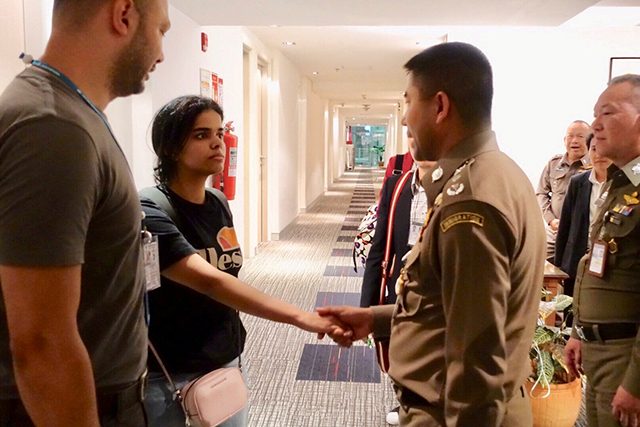
BEIRUT — World headlines about an 18-year-old Saudi Arabian woman seeking asylum in Thailand have thrown the spotlight on the conservative kingdom’s guardianship system where male relatives take charge of key decisions in a woman’s life.
The United Nations Refugee Agency said it was investigating Rahaf Mohammed al-Qunun’s case after she fled to Thailand on Saturday from Kuwait saying she feared her family would kill her if she were sent back to Saudi Arabia.
Qunun told the world of her plight on social media, drawing widespread concern. She told Reuters she was fleeing her family’s “physical, emotional and verbal abuse,” adding she was restricted from travel and continuing her education.
Her father is now in Bangkok and asking to speak with Qunun, Thai authorities said.
The case has drawn fresh global attention to Saudi’s guardianship system, whereby women must have permission from a male relative to work, marry, and travel.
Rights groups say the system can trap women and girls as prisoners of abusive families.
“She, and other Saudi women have the right to live in dignity without constraint of guardianship. They are controlled in each and every step, and this is strangling,” said Suad Abu-Dayyeh from global rights group, Equality Now.
“I am not surprised if we see more girls doing what Rahaf has done. Taking the lead after Rahaf and not wanting to live in this male guardianship system,” she told the Thomson Reuters Foundation by phone.
Qunun told Reuters via text and audio messages that she had fled Kuwait during a family visit there, and had planned to travel to Australia to seek asylum.
She said she was held after leaving her plane in Bangkok and told she would be sent back to Kuwait.
Thai authorities reversed a decision to expel her and allowed Qunun to enter the country under the care of the UNHCR.
Qunun is staying in a Bangkok hotel while the UNHCR processes her application for refugee status, before she can seek asylum in a third country.
Adam Coogle, Middle East researcher at Human Rights Watch, said the desire for women like Qunun to escape these “awful situations” is understandable, but also dangerous.
“It is certainly possible more women could do this after Rahaf. But it is dangerous and it doesn’t always work,” he said by phone.
“I would hope that they can find a safe place to go to where they don’t face the possibility of being sent back.”
In 2017, a Saudi woman who sought asylum in Australia, and said she feared violence from any relatives who came to bring her back home, was stopped on a layover in the Philippines and returned to Riyadh.
Qunun’s case comes at a time when Riyadh is facing unusually intense scrutiny from its Western allies over the killing of journalist Jamal Khashoggi at the Saudi consulate in Istanbul in October and over humanitarian consequences of its war in Yemen.
Zainah Anwar, executive director of Musawah, a global project, which seeks to restore equality and justice for men and women in Muslim family law, said the guardianship system treats women as if they were “children” in Muslim Saudi Arabia.
“Until the male guardianship system is done away with, in law and in practice, women’s rights in the kingdom cannot be realised,” she said in a statement. —Reporting by Heba Kanso @hebakanso; Editing by Jason Fields, Thomson Reuters Foundation



